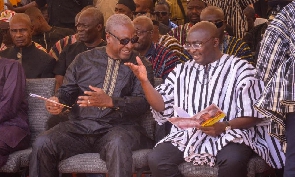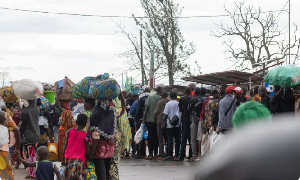“Bhim” and “Paahpaah” started as ad libs; they mean nothing except that they fetch money and fame for Stonebwoy and Shatta Wale respectively.
The two musicians who both take inspiration from Reggae and Jamaican culture have themed their messages to identify with the struggles of the youth.
Even though reggae became more prominent after Ghana’s independence, its core message emphasizes struggles against oppression, initially against White colonialists and then against fellow Black politriKcians, who deposed White oppressors only to perpetuate similar tactics.
That knowledge – or rather consciousness – which does not require much formal schooling to understand, is exactly what Shatta Wale and Stonebwoy have been preaching, except that they are rivals – rivals for marketing dollars and Cedis.
Therefore it came as a shock when on 11 May, 2019, the two Ghanaian superstars, celebrated for their Dancehall/Afropolitan music, were brought on a common Vodafone platform, together with other musicians, for a free concert at the Independence Square in Accra, ahead of the 20th Vodafone Ghana Music Awards (VGMA) held on Saturday, 18 May.
Some critics thought, they had been fooled, and they had allowed themselves to be fooled for nothing. To such fans, the fistfights and commotion on stage by the Bhim Nation and Shatta Movement For Life teams at the 20th VGMA with a pistol and pepper spray on display dissipated a sense that all that they hear from the two rival camps are for real.
It is interesting that at the VGMA, Shatta’s song “Gringo” won Reggae/Dancehall song of the year, whilst Stonebwoy won Reggae/Dancehall Artiste of the Year. Clearly Reggae/Dancehall music dominate youth culture in Ghana now.
A university student leadership in Accra had at an earlier date spent at least 7000 Cedis (USD1500) to invite Shatta Wale for a 30-minute show as part of SRC week.
When this matter came up for debate, some students saw this as a Corporate Social Responsibility performed by the student body for the university. They argued that the youth in Ghana will believe in the clout of the SRC, and the university will get favourable ratings among prospective students.
One of us met Shatta Wale at his home and can report that Wale is different from what he is on stage. Arguing with Stonebwoy in public is not the real Shatta Wale. The reason why Wale is loud is that when he was Bandana, “it wasn’t working”. His new brand is to be loud, brash and controversial. It makes money.
Wale cemented this ideology when he went to Jamaica. He explained that in Jamaica, he realized the people were free and they say it as it is, also called Parrhesia.
This is the complete opposite of what often happens in Ghana; people are more reticent.
Stonebwoy is not so outspoken outside of public appearances; he is reserved; the quiet type, from a backstage experience of him.
Both musicians have been to Jamaica.
Shatta Wale spent about 12 months in Jamaica to soak in Jamaican street culture and hence fine tune his lyrics. Stonebwoy, on the other hand, has not spent that length of time there.
So what has Shatta Wale been singing about? Shatta Wale has insisted in several media interviews that when he was Bandana all his songs about HIV/AIDS and sanitation were ignored, and made no money. But since he started singing about “Paahpaahpaah” and the ghetto lifestyle, he is making it. Many Ghanaians have confirmed this.
This raises serious issues about education and youth culture. We all know that Ghana is engulfed in filth. We also know that these are musicians that politicians utilise to draw the youth towards their political parties.
The Album of the Year for instance was won by Kuami Eugene, a youth. On receiving the award, he acknowledged Wale, Stonebwoy and Samini, co-nominees who are charting the path for the young ones and declared, “Rockstar – Fadama for life”. Now Fadama is an economically challenged and deprived neighbourhood – a shanty town in Accra, comprising parts of Darkuman, Bubiashie, Odorkor and New Fadama. How can Kuami Eugene, who had earlier been acknowledged during the awards night by Amakye Dede, a highlife musician for a wonderful joint performance in London, England, identify with a slum? Does that mean Kuami Eugene is fooling the upwardly mobile class who identify with his music or taking advantage of the slum youth and culture to build his market?
So who is influencing who? At the Ghana National Commission for UNESCO office in Accra, policy makers including expatriates are studying ways of integrating culture within the formal education or school system. UNESCO Commissioned a book titled General history of the Caribbean; Volume V: The Caribbean in the twentieth century. This is what the reviewers from New West Indian Guide had to say.
“Completeness and consistency are not the strong points of this UNESCO history. ‘African and Indian consciousness’ and a series of closing chapters on gender, family, ideology and identity, and religion…………are very useful but offer limited historical analysis. In addition, one misses in-depth discussion of issues in the realm of culture, such as popular music, the arts in general, or sports.”
We learn from this review that UNESCO’s consultants did an incomplete job. But does that suggest our Ghanaian musicians’ business trips to Jamaica have given them a more thorough understanding of Jamaican culture and music? We do not believe so either.
We also know that Wale’s education about Jamaica is incomplete. For example, Caribbean beaches are well branded for tourists from around the world. They are far better and cleaner than Ghanaian beaches. And it is possible through music to influence the national agenda as was done in Cuba.
Therefore where the artistes need direction and recognition, sponsors such as Vodafone should be ready and capable of bringing that influence on the national development agenda.
Ghana surely needs corporate heavyweights such as Vodafone to promote excellent sanitation and clean beaches.
And this certainly ties in with promoting reggae and showcasing street culture. The 20th Vodafone Ghana Music Awards (VGMA) was themed “For the people, the culture and the music”, so Vodafone should walk the talk.
If the Ghanaian society is to flourish, beginning with improved sanitation which will (as happened everywhere else including Europe) negate the need for malaria vaccines, then Vodafone Ghana, sponsors of the Vodafone Ghana Music Awards, and Charterhouse, the event orgainizers, should reward values more, rather than popularity.
Yes, this may cause Vodafone to lose popularity in the short term, and create the grounds for rival event organizers and sponsors to take over the market.
But if Vodafone’s PR is not defined by values, then why have they joined the Institute of Public Relations Ghana to preach to the nation about values?
Feedback; ato@writersghana.com; LinkedIn, Isaac Ato Mensah; Instagram, @atomenswriters; Twitter, @Atomens; Facebook, Isaac Ato Mensah; Telegram, Isaac Ato Mensah; Quora, Isaac Ato Mensah. WhatsApp (233) 020 022 0353.
Writers and Shakespeares Ghana Limited exist to be a moral and intellectual guide to the best practice of PR and integrated communications around the world, beginning with Ghana.
Opinions of Monday, 20 May 2019
Columnist: Isaac Ato Mensah & Joan Agyekum-Nsowah















